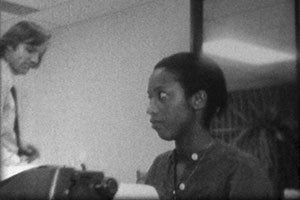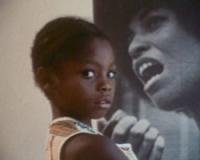Rain, a short film by Melvonna Ballenger, offers the audience “a chance to recollect, a cool out,” and after all we’ve seen and heard about the L.A. Rebellion, that’s exactly what the day-long Symposium that preceded the screening took time to do. The most notable feature of the film was its use of music and the ways it weaved in and out of the main character’s world while consistently mediating the mood and tone of the piece and, more importantly, dictating the character’s own relationship with her surroundings. In the opening scene, the young woman changes her radio dial, with each change in radio station bringing up yet another popular song about rain, as if selecting among the myriad of ways she can choose to re-establish her life’s path.

In the beginning, the young woman seems to resent rain as much as she resents the start of the work week, but towards the end, she comes to the realization that it is rain, in a metaphoric sense, that has enabled her to look upon her life and change it for the better, finding personal fulfillment in her growing political awareness. On top of the musical meditations on rain by the soundtrack lies the character’s own voice and thoughts about life, rain, and her own chance to recollect and reinvigorate her life. Her voice possesses a lyrical quality that works in tandem with the melodious flow of the soundtrack, having a meditative effect that encourages the reflection needed for change, both for the audience as well as for the young woman on screen. Yet what is most striking about this film, apart from the quality of its sound design, is the visual of umbrella’s being used in L.A., a geographic space characterized by sunny days.
It may have been the quality of the video transfer that was projected and the apparent degenerative state of the original source material, but one got the sense (emboldened by the presence of only a few umbrellas within the film) that it was not actually raining anywhere physically within the story, except in the mind of the protagonist. Rain in L.A., umbrellas in the sun, provide such an absurd visual contradiction that does not make sense initially, but when we consider how clouded the protagonist’s judgment is at the beginning and how she ultimately finds a cleansing strength in the power of rain, L.A.’s relentless sun takes on an almost oppressive presence, as if it were the limiting force in her moment of change. Ultimately, Rain seeks to express a cleansing experience characterized by positive change and productive reflection, and this also seems reflective of our contemporary focus on the L.A. Rebellion and the powerful implications the movement has as we move forward to create change by commemorating the past.
—Rachel Wilson






 Mobile Navigation
Mobile Navigation

